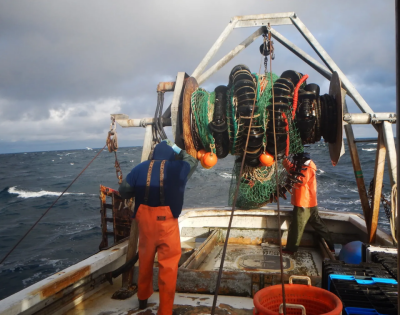Bill Hogarth's NMFS
A kid around town who mowed lawns took on more work than he could handle — this back in the 1960s before the proliferation of overpriced "hand-crafting" landscapers — and went looking for help.
"The pay's not good," he told us, "but the hours are long." Summer was short, and he didn't get any takers.
There are still plenty of jobs that fit that description, and as far as I'm concerned, running NMFS stands out among them.
Bill Hogarth took the job anyway, more than six years ago.
It was not a stretch — he'd first joined the agency in 1994, and he was involved with North Carolina fisheries before that — and so despite the fact that he knew what he was in for, he took the post.
A lot of us had high hopes for Hogarth and I think he set his own sights high as well. "This is my last job," he told me at Fish Expo in Seattle in the beginning, which I took to mean that he planned to do it as he saw fit.
One thing he wanted to do was get NMFS out from under the mountain of lawsuits it faced. Second on his list, I think, was rationalizing fisheries.
Later on, he also focused on the International Commission for the Conservation of Atlantic Tunas and on paving the way, under the auspices of NMFS, for aquaculture in the U.S. exclusive economic zone.
I can see his point about the lawsuits — to a point. Litigation is costly and often counterproductive, but the courts are there for a reason, and sometimes litigation is necessary to achieve a just outcome. For example, I believe NMFS yielded to pressure from environmental advocates for the northern right whale rather than take a stand for common sense gear restrictions for inshore lobstermen in the Gulf of Maine.
And I understand his zeal for individual fishing quotas — now referred to as limited access privilege programs. However painful the initial allocation of shares is for those who become disenfranchised, ultimately the bureaucrat inherits a bunch of relatively happy campers who have enough fish to go around.
Trouble is, I have never been convinced that the job of fishery managers is making their job easier; it is promoting fisheries, which means that sustaining fishing communities is job No. 2, right after sustaining the resource on which those communities depend.
You can make the case that IFQs sustain fishing communities, but I will argue how many, and how large.
I was somewhat surprised, at first, by the effort Hogarth poured into ICCAT, but there's no disputing the importance of Atlantic tuna, and no question that the United States needs zealous representation of its interests.
Hogarth would be the first to say — as he did in mid-December at his farewell press conference — that he wished he could have had more success in his dealing with the ICCAT nations. The fact that he did not, however, reflects more on the avaricious eyes with which some countries view transboundary stocks such as the bluefin than it does on Hogarth.
I don't know if Hogarth was cajoled into becoming a champion of ocean aquaculture or if he was motivated, as he has said, by his desire to see the United States produce more seafood. In any event, his advocacy has produced a great deal of angst, not only within fishing communities that see ocean aquaculture as a competitive threat — and one that portends even more restrictions — but among environmentalists as well.
Addressing the common concern of both groups, the Dec. 14 journal Science reported on a study suggesting that sea lice escaping from salmon farms in British Columbia's Broughton Archipelago are killing as many as eight out of 10 wild pink salmon smolts in the area, threatening the runs with extinction in just a few years.
Obviously, this isn't what Hogarth wants.
The reality, of course, is that one man's ability to shape the bureaucracy is limited. We should no more blame Hogarth for the agency's shortcomings over the last few years than we should exalt him for the recovery of haddock, swordfish and other stocks.
Probably the best we can hope for in an administrator is someone who is candid with his constituents, energetic in his workplace and wise enough in the ways of Capitol Hill and the world beyond to focus on the possible — or what is most likely possible — and on those points we are likely to conclude that we were capably served by Bill Hogarth.






